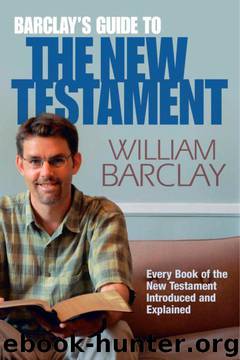Barclay's Guide to the New Testament by William Barclay

Author:William Barclay [William Barclay]
Language: eng
Format: epub
Published: 2011-07-05T15:25:00+00:00
17
James
An Early Christian Sermon
James is one of the books which had a very hard fight to get into the New Testament. Even when it did come to be regarded as Scripture, it was spoken of with a certain reserve and suspicion, and even as late as the sixteenth century the reformer Martin Luther would gladly have banished it from the New Testament altogether.
The Doubts of the Early Christian Fathers
In the Latin-speaking part of the Church, it is not until the middle of the fourth century that James emerges in the writings of the fathers. The first list of New Testament books ever to be compiled is the Muratorian Canon, which dates to about AD 170 - and James is absent from it. Tertullian, writing in the middle of the third century, is an immense quoter of Scripture; he has 7,258 quotations from the New Testament, but never one from James. The first appearance of James in Latin is in a Latin manuscript called the Codex Corbeiensis, which dates to about AD 350. This manuscript attributes the authorship of the book to James the son of Zebedee, and includes it, not with the universally acknowledged New Testament books, but with a collection of religious tracts written by the early fathers. James has now emerged, but it is accepted with a certain reservation. The first Latin writer to quote James verbatim is Hilary of Poitiers in a work On the Trinity, written about AD 357.
If, then, James was so late in emerging in the Latin church, and if, when it did emerge, it was still regarded with some uncertainty, how did it become integrated into the New Testament? The moving influence was that of the biblical scholar Jerome, for he unhesitatingly included James in his Latin version of the New Testament, the Vulgate, completed early in the fifth century. But even then there is an accent of doubt. In his book On Famous Men, Jerome writes: `James, who is called the brother of the Lord ... wrote only one epistle, which is one of the seven catholic epistles, and which, some people say, was issued by someone else under James' name.' Jerome fully accepted the letter as Scripture, but he felt that there was some doubt as to who the writer was. The doubt was finally set at rest by the fact that Augustine fully accepted James and was not in doubt that the James in question was the brother of our Lord.
James was late in emerging in the Latin church; for a long time there was a kind of question mark against it, but in the end, and only after a struggle, Jerome's inclusion of it in the Vulgate and Augustine's full acceptance of it brought it full recognition.
The Syrian Church
One would have thought that the Syrian church would have been the first to accept James, if it was really written in Palestine and was really the work of the brother of our Lord; but in the Syrian church there was the same wavering and swinging of opinion.
Download
This site does not store any files on its server. We only index and link to content provided by other sites. Please contact the content providers to delete copyright contents if any and email us, we'll remove relevant links or contents immediately.
Periodization Training for Sports by Tudor Bompa(8252)
The Body: A Guide for Occupants by Bill Bryson(5080)
The MacArthur Bible Commentary by John MacArthur(4823)
The Sports Rules Book by Human Kinetics(4379)
What It Really Takes to Get Into Ivy League and Other Highly Selective Colleges by Hughes Chuck(3744)
Marijuana Grower's Handbook by Ed Rosenthal(3676)
The Sprouting Book by Ann Wigmore(3586)
The Martian by Andy Weir(3414)
Salt, Fat, Acid, Heat: Mastering the Elements of Good Cooking by Nosrat Samin(3139)
The Bread Bible by Rose Levy Beranbaum(3066)
Sapiens and Homo Deus by Yuval Noah Harari(3063)
Harry Potter 4 - Harry Potter and The Goblet of Fire by J.K.Rowling(3057)
The Marketing Plan Handbook: Develop Big-Picture Marketing Plans for Pennies on the Dollar by Robert W. Bly(3046)
Classic by Mary Berry(3010)
Martha Stewart's Baking Handbook by Martha Stewart(2853)
Screenplay: The Foundations of Screenwriting by Syd Field(2635)
The Plant Paradox by Dr. Steven R. Gundry M.D(2611)
50 Economics Classics by Tom Butler-Bowdon(2568)
The Cambridge Grammar Of The English Language by Rodney Huddleston Geoffrey K. Pullum(2416)
